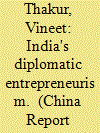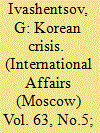| Srl | Item |
| 1 |
ID:
124988


|
|
|
|
|
| Publication |
2013.
|
| Summary/Abstract |
The article documents India's involvement in the Korean crisis from 1950-1952. It argues that India's 'diplomatic entrepreneurism' allowed it to become the interlocutor, mediator and adjudicator, all rolled into one, helping India to create a space of manoeuvre for itself in the fast polarizing international system. Jawaharlal Nehru expectedly is the main protagonist in this tale, yet it also seeks to bring forth contributions of other Indian diplomats which have generally been buried under Nehru's weight, in studies on Indian foreign policy. Moreover, it responds to the call for a greater engagement with Indian diplomatic history, a field that is severely understudied.
|
|
|
|
|
|
|
|
|
|
|
|
|
|
|
|
| 2 |
ID:
156333


|
|
|
|
|
| Summary/Abstract |
THE YEAR 2017 has brought an aggravation of the North Korean nuclear problem. Donald Trump's assumption of office as U.S. president coincided in time with a new stage of the North Korean nuclear missile program. Kim Jong-il, the deceased father of current North Korean leader Kim Jong-un, apparently had assumed that the hypothetical possibility of retaliatory nuclear strikes against the United States and its allies was a sufficient guarantee of North Korea's security and so was quite satisfied with his country's relatively small nuclear deterrence arsenal - just about a dozen warheads - and didn't worry too much about means of their delivery. Kim Jong-un has gone further. He has ordered making more nuclear warheads and effective delivery means - intercontinental ballistic missiles (ICBMs) and submarine-launched ballistic missiles (SLBMs). This essentially means that North Korea aspires to become a full-scale nuclear power with the potential to survive a nuclear attack and inflict unacceptable damage on its adversary, the United States.
|
|
|
|
|
|
|
|
|
|
|
|
|
|
|
|
| 3 |
ID:
123831


|
|
|